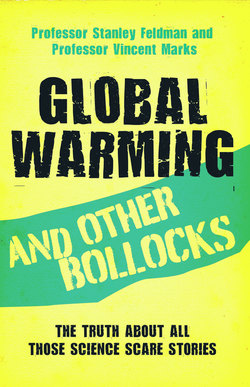Читать книгу Global Warming and Other Bollocks - Stanley Feldman - Страница 22
На сайте Литреса книга снята с продажи.
Is the world getting warmer?
ОглавлениеThe answer to this question is that it all depends upon the length of the period studied.
If one takes a very long timescale – say 400 million years – then the answer is no: Earth is at least 10 degrees colder today. If one takes a shorter period – say 10,000 years – then the answer is yes: the world is slowly getting a little bit warmer. There is good evidence of what has been called the medieval warm period in northern Europe between 700 and 1000 CE, when temperatures soared. This was followed some 600–700 years later by the Little Ice Age when the Thames froze over and Bruegel painted his landscapes of the frozen Dutch countryside. It was probably during this period that there was a great expansion of the Arctic ice cap, extending it almost to the shores of Scotland. It caused the abandonment of the Viking settlements in Greenland, which before this time was covered with forests, and the closing of the Northwest Passage from the Atlantic to the Pacific by pack ice.
Coming nearer to our times, in the hundred years 1900 to 2000, northern Europe and America have warmed up by about 0.8ºC and the whole world by about 0.6ºC. This has occurred mainly as a result of warmer and shorter winters. However, between 1940 and 1975 there was reversal of this warming trend and Europe cooled by about 0.3–0.4ºC. So marked was this cold period that predictions of an impending disastrous ice age abounded in the environmentally conscious ‘green press’.
A word of caution about ‘average temperatures’. Until recent times only maximum and minimum temperatures were recorded in many places. Often the places used as weather stations change over the years, and many are near town centres and may be affected by urban warming. During the breakup of the Soviet Union many stations were closed.
In the 25 years from 1975 the world warmed up by about 0.5ºC, although this started to plateau off in 1998 (see Figure 3.6). In the past nine years, accurate monitoring of global temperature by orbiting satellites has shown that this period of global warming has come to an end. Instead of rising, there has been a fall in temperature of about 0.4ºC.
Figure 3.6: Global estimates of temperature change over 140 years (note the 0.6º rise from 1975 to 1998 that gave rise to the global-warming scare) (Calculation from Met Office Hadley Centre)
The net increase in temperatures, recorded over the past hundred years, appears to have been the result of fewer very cold nights, and only modest increases in the daytime temperatures. Table 3.1 demonstrates that the highest temperatures recorded were reached, in various parts of the world, over 50 years ago. Indeed, the number of days when the summer temperature has exceeded 32ºC in the South of France has decreased markedly.
| Continent | All-time high (ºF) | Place | Date |
| Africa | 136 | El Azizia, Libya | 13 September, 1922 |
| North America | 134 | Death Valley, CA | 10 July, 1913 |
| Asia | 129 | Tirat Tsvi, Israel | 22 June, 1942 |
| Australia | 128 | Cloncurry, Queensland | 16 January, 1889 |
| Europe | 122 | Seville, Spain | 4 August, 1881 |
| South America | 120 | Rivadavia, Argentina | 11 December, 1905 |
| Oceania | 108 | Tuguegarao, Philippines | 29 April, 1912 |
| Antarctica | 59 | Vanda Station, Scott Coast | 5 January, 1974 |
Table 3.1
